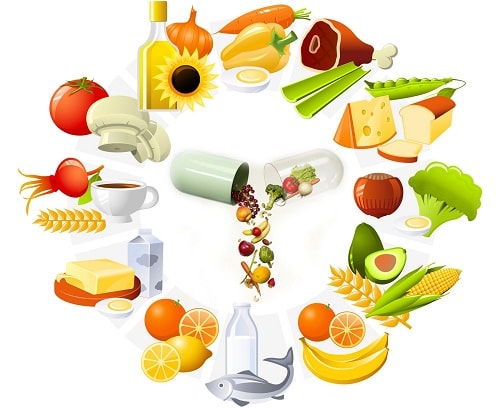Choose the right menu... for your medication
Food and medicine are both metabolized and absorbed in the digestive system. Both food and medicine are necessary for the body, but sometimes mixing them together can cause adverse reactions. Therefore, to maximize the effectiveness of the medicine, it is necessary to consider before combining these two factors at the same time.
Food-drug interactions
The risk of food-drug interactions depends on the general health status of the body, the disease status, diet, type of food, use of multiple drugs, etc. Drugs can increase or decrease the nutrition of food. Conversely, the nutritional status of the patient can reduce the effect or increase the toxicity of drugs. In addition, food can delay or make it difficult to absorb drugs, speed up or slow down the metabolism, and prevent the effects of drugs. It should be noted that food especially affects the absorption of slow-release drugs.
 |
| Some foods can make it difficult for medication to be absorbed. |
If the medicine is taken after a meal, food can significantly affect the absorption of the medicine. Food also creates a physical barrier that prevents the dissolution of the medicine and the contact of the medicine with the intestinal mucosa or creates chemical bonds and reactions with the medicine, thereby hindering the absorption of the medicine.
Foods containing a lot of lipids usually float on top, so they are slower to be expelled from the stomach than foods containing a lot of carbohydrates and proteins. Non-ionized drugs have a high affinity for lipids. If taken after a meal, they can dissolve in the lipid layer of the food and therefore be slowly transported to the intestines and also be slowly absorbed into the blood. Meals containing a lot of proteins increase blood flow to the intestines, while lipids reduce this blood flow. Through many different mechanisms, food can slow or reduce the absorption of many drugs such as alendronate (drug to treat gout and bone and joint diseases), doxazosin (drug to treat cardiovascular diseases), levodopa (drug to treat Parkinson's disease), atenolol (antihypertensive drug)... However, food can significantly increase the absorption of many drugs such as: antibiotics clarithromycin, cefuroxime; danazol (hormones); itraconazole (antiparasitic, antifungal drugs)...
How to combine medicine and food?
Food can cause many obstacles for the drug to take effect and treatment effect, but if used properly, food and medicine will increase the effectiveness of the drug, at the same time, food has the ability to protect the stomach and intestinal mucosa from the stimulation of the drug, helping to avoid many diseases of the digestive system when using the drug for a long time. Therefore, knowing which foods are suitable or not suitable for the drug you are taking will help to increase the effectiveness of the drug.
Normally, when prescribing, the doctor will advise the patient on the appropriate time to take the medicine and the instructions for use of the medicine will state the time of use: before, during or after meals, but the manufacturer never clearly states what foods should or should not be eaten while taking the medicine. Therefore, people taking medicine need to know some basic information about the compatibility of foods and medicines.
Cardiovascular glycosides are chemically very similar to proteins. Therefore, when taking them, it is necessary to reduce the amount of protein in food (eat less meat, poultry, fish, cheese, beans). Do not completely eliminate these foods, but reduce the amount used and strictly follow the time of taking them as stated in the instructions or as prescribed by the doctor.
Fat (lipid) reduces gastric juice secretion, slowing down the digestion of food, which means that after eating, the medicine will be absorbed more slowly. But lipid is needed for the absorption of fat-soluble drugs (vitamins A, D, E, K, anticoagulants...). On the contrary, when taking aspirin, you should eat foods low in protein and fat.
Sugar and sweet foods slow down the action of substances in the stomach, leading to the absorption of sulphadimetoxin, sulphamethoxypiridazine, similar drugs and many other drugs. Digestive medicine often has a bitter taste to stimulate gastric juice, increase appetite and help the digestion process easier. If you eat sweets while taking digestive medicine, it will reduce the inherent effectiveness of the medicine and cause unwanted side effects.
Digestive juices have a strong influence on the transformation of drugs in the body. When hungry, the acidity of gastric juices is low, which is good for drugs such as glycosides for cardiovascular diseases as well as drugs that do not irritate the stomach lining. These drugs are absorbed faster when taken on an empty stomach.
During meals, the acidity of gastric juice is very high, thus significantly affecting the stability of drugs and their absorption into the blood. In an acidic environment, the effect of erythromixin, lincomixin and other antibiotics is partially reduced.
The therapeutic effect of sulphanilamide drugs (antibiotics) is significantly reduced or completely lost when taken with foods rich in folic acid (found in liver, kidney, spinach, lettuce and pumpkin).
When taking deworming drugs, you should eat a lot of fiber-rich foods such as fruits and green vegetables to increase intestinal motility, helping to quickly expel worms from the body. In addition, you should not eat fatty foods because deworming drugs can dissolve in fat, increasing toxicity to the body, reducing the effectiveness of deworming.
According to SKDS
| RELATED NEWS |
|---|

